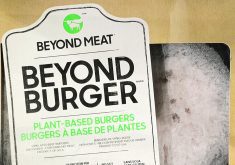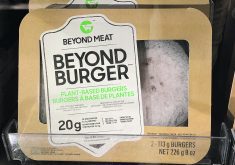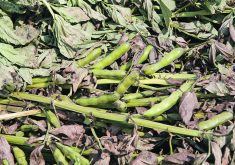Leonardo DiCaprio has just used his A-list magic powers by investing in two American cultured-meat startups, Aleph Farms and Mosa Meat.
This is the same actor who invested in a vegetable protein company before the plant-based phenomenon was a thing. Beyond Meat is now worth more than US$8 billion. DiCaprio saw it coming before the rest of us.
The idea of replacing the livestock industry with laboratories using animal cells is mesmerizing. Humanity would no longer need to raise livestock to enjoy animal protein. In just a few years, we could grow meat in labs, or our kitchens, in small stainless-steel bioreactors.
Read Also

Downturn in grain farm economics threatens to be long term
We might look back at this fall as the turning point in grain farm economics — the point where making money became really difficult.
All the problems meat-packing plants faced during the pandemic, and meat recalls, could be things of the past. The idea of slaughtering animals could be seen as ancient and barbaric.
A McKinsey and Company report recently suggested that the global cultivated meat market could reach US$25 billion by 2030.
Forecasts also suggest the production price will drop significantly over the next nine years, from more than $10,000 per pound today to about $2.50 per lb., a staggering 4,000-fold reduction.
For climate change advocates, this will be a godsend.
Cattle consume about 25 calories of plant material for every calorie of edible protein they produce. Even chickens, which offer the most efficient plant-to-meat ratio, will eat nine to 10 calories of food for every calorie of edible protein produced.
Cultured meat would offer a four-to-one ratio, more than half of what chickens require. Other comparisons aren’t even close.
The science needs work, though. More than 100 research projects on cultured meat are being conducted around the world, funded by venture capitalists and philanthropists. Yet cultivated meat companies have repeatedly missed product launch deadlines.
Creating the right product is challenging for a variety of reasons.
Putting our environmental enthusiasm aside, shifting our collective attitude toward accepting cultured meat won’t be easy. Food is cultural, and culinary traditions have given meat a privileged role over centuries, at least in the Western world. Allowing labs to replace farms won’t be a natural shift.
Most important, land occupancy will become a critical issue. More cultured meat in our diets may mean fewer farms and farmers, compromising our rural economy’s future prosperity.
That’s certainly a challenge, especially in Canada. Expect groups to push back, as we’ve seen with the plant-based movement.
Labelling will be another issue. The cost to produce cultured meat will eventually be lower than that of conventional meat. This could make animal proteins more affordable and if producers label them as such, consumers will have a choice.
Cultured meat could change our relationship with animal proteins. But as with other disruptive, revolutionary technologies that assure the betterment of our planet, the change won’t come easily.
Elon Musk understood a long time ago that to give the electric car its proper due and push aside the powerful car dealership cartels, the influence of the oil industry and the incredible economic clout of auto manufacturers, he needed to build a case for the e-car with the consumer.
And he did. Musk became the communicator and dreamer the electric car needed.
Today, Tesla is worth more than US$700 billion.
If lab-grown food is ever to become a thing, the industry will need its own Elon Musk. That person might be Leonardo DiCaprio.
Sylvain Charlebois is senior director of the agri-food analytics lab and a professor in food distribution and policy at Dalhousie University. This column first appeared on the TroyMedia website. It has been edited for length.

















